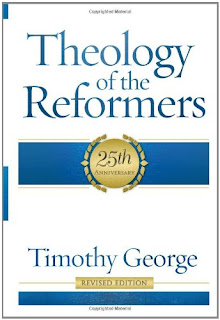Book in Review: Theology of the Reformers
 This is a fabulous work from Timothy George. Theology of the Reformers is clear, easy to read, and incredibly scholarly. George overviews the beliefs of five reformers: Luther, Zwingly, Calvin, Simons, and Tyndale--a daunting task given the multitudes of volumes manufactured by them collectively. Nevertheless George is succinct and summarizes each individual brilliantly.
This is a fabulous work from Timothy George. Theology of the Reformers is clear, easy to read, and incredibly scholarly. George overviews the beliefs of five reformers: Luther, Zwingly, Calvin, Simons, and Tyndale--a daunting task given the multitudes of volumes manufactured by them collectively. Nevertheless George is succinct and summarizes each individual brilliantly.Many today blame the reformation for shattering the universal church of Christ into innumerable factions. Like broken shards of glass, each denomination is severed from the whole and sharp to the touch. This is no doubt an unintended consequence of the reformation. Luther and Zwingly divided over the Eucharist. Calvin detested the Anabaptist schism. And what was originally intended as a correction of the church (from Luther) turned into a full split.
Timothy George however addresses the misconception that the Catholic Church of the Middle Ages was one perfectly unified body. Curialism (for complete Papal authority), Conciliarism (desiring accountability for church leadership), Spiritual Franciscans, Waldensians, and the movements of Wycliffe and Huss--all represent different factions vying for power inside and amongst the Catholic church prior to the reformation. To say that the reformation alone caused the many schisms we see today would be dishonest; there was already great diversity of belief within the church long before the reformation ever occurred!
With that being said, the reformation was a necessary correction back to Scripture. The selling of indulgences, salvation through sacraments, the office of 'the great middle man" the priest, and the centrality of Mary-- had made the church something that it was not. Apostate. These five reformers--though not unified, were unified in these things: Authority of Scripture, Salvation through faith alone, and the belief that God's Word was for laymen. To say such things was revolutionary, and for each of the reformers it guaranteed persecution. Tyndale was martyred. Calvin was banished from France. Simons was hunted down his entire life. Yet God's Word was proclaimed and we today reap the benefits.
We are indebted to these men. Each had flaws and George did not shy away from them. Luther, to his great shame, spoke ill against the Jews. Zwingly attempted to blend church and state. Calvin burned Servetus at the stake. It would be foolish to look for perfection in any man especially our heroes. But each man had a conviction to the Word of God and to His conscience. Each man stood against the falsehood and proclaimed the truth--despite great personal cost. "We are like dwarfs standing on the shoulders of giants; thanks to them, we see farther than they."
Find my review helpful? Let me know at Amazon.com.



Comments
Post a Comment